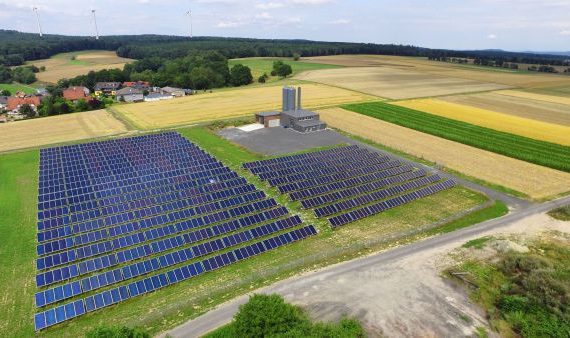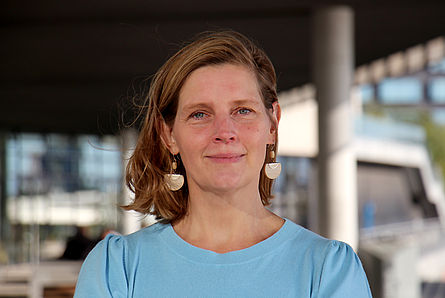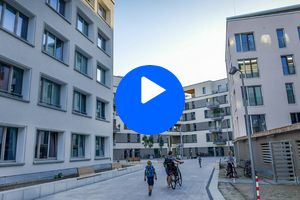The first results of the timber housing study will be presented at the 15th Congress on Efficient Building with Wood in Urban Areas on 19 October 2022 in Cologne. So far, 118 large-volume housing projects with more than 100 units have been identified across Europe by the HFR researchers, 47 of which are located in Germany. Final results will be presented in early December at the 26th International Timber Construction Forum in Innsbruck on 30 November 2022 and will also be published in a brochure by Informationsdienst Holz.
Kategorie für Blog: Construction and operating costs
A new study from Denmark takes a look at the costs of sustainable building construction and shows that more sustainable does not automatically mean more expensive. On the contrary. The study by Buus Consult on behalf of the DGNB system partner from Denmark, the Green Building Council Denmark, now provides clarity. In the study, it takes a close look at 37 DGNB-certified buildings.
 With the portal https://energiewendedörfer.de the University of Kassel and Georg-August-Universität Göttingen will present the initial results from the joint project "Innovative concepts and business models for sustainable bioenergy villages - climate-friendly, democratic, citizen-centred". In particular, concepts are being developed for bioenergy and biogas plants that can enable continued economic operation after the current 20-year EEG phase.
With the portal https://energiewendedörfer.de the University of Kassel and Georg-August-Universität Göttingen will present the initial results from the joint project "Innovative concepts and business models for sustainable bioenergy villages - climate-friendly, democratic, citizen-centred". In particular, concepts are being developed for bioenergy and biogas plants that can enable continued economic operation after the current 20-year EEG phase.
 Dr. Kirsten David, a researcher at HafenCity University (HCU) Hamburg, has developed an innovative method for determining rent increases after energy efficiency measures: By means of functional cost splitting, rent increases become appropriate and comprehensible. The planning of the energetic measures is also ecologically optimized. For her dissertation entitled "Functional Cost Splitting for the Determination of Rent Increases after Energy Efficiency Measures", the scientist today receives the "BUND Research Award 2020". With the research award, the Bund für Umwelt- und Naturschutz (BUND) honors scientific work on sustainable development.
Dr. Kirsten David, a researcher at HafenCity University (HCU) Hamburg, has developed an innovative method for determining rent increases after energy efficiency measures: By means of functional cost splitting, rent increases become appropriate and comprehensible. The planning of the energetic measures is also ecologically optimized. For her dissertation entitled "Functional Cost Splitting for the Determination of Rent Increases after Energy Efficiency Measures", the scientist today receives the "BUND Research Award 2020". With the research award, the Bund für Umwelt- und Naturschutz (BUND) honors scientific work on sustainable development.
 From 1 January 2021, climate-damaging fossil fuels will be subject to a price of 25 euros per tonne of CO2 is proven. This means that oil and diesel will become more expensive by 7.9 cents per litre, petrol by 7 cents per litre and natural gas by 0.6 cents per kilowatt hour. Citizens will be relieved of the additional costs, among other things, by a reduction in the price of electricity. The amendment, which had already been passed by the Bundestag on Thursday, also passed the Bundesrat today. The Fuel Emission Trading Act (BEHG) is designed to reduce CO2-price in the form of national certificate trading for the heating and transport sectors.
From 1 January 2021, climate-damaging fossil fuels will be subject to a price of 25 euros per tonne of CO2 is proven. This means that oil and diesel will become more expensive by 7.9 cents per litre, petrol by 7 cents per litre and natural gas by 0.6 cents per kilowatt hour. Citizens will be relieved of the additional costs, among other things, by a reduction in the price of electricity. The amendment, which had already been passed by the Bundestag on Thursday, also passed the Bundesrat today. The Fuel Emission Trading Act (BEHG) is designed to reduce CO2-price in the form of national certificate trading for the heating and transport sectors.
A further 700,000 euros will be available for #moinzukunft cargo bikes from 1 April. Up to 2,000 euros in subsidies are possible for the purchase of a new e-load bike and 500 euros for normal load bikes.
 Climate protection and socially just construction and housing must be considered together - Legal regulations in the rental housing sector and state subsidy practice undermine climate goals in the building sector - Deutsche Umwelthilfe and Deutscher Mieterbund present 10-point immediate programme for socially acceptable design of energy modernisation in existing and new buildings - KfW subsidy practice must be subjected to a reality check - Social provisions must be supplemented by climate policy requirements
Climate protection and socially just construction and housing must be considered together - Legal regulations in the rental housing sector and state subsidy practice undermine climate goals in the building sector - Deutsche Umwelthilfe and Deutscher Mieterbund present 10-point immediate programme for socially acceptable design of energy modernisation in existing and new buildings - KfW subsidy practice must be subjected to a reality check - Social provisions must be supplemented by climate policy requirements
Germany's largest cooperative housing project in Berlin 28:58 min Video available until: 12/02/2020 First broadcast on: 2.12.2019 Living in the metropolis, in a large community, according to its own rules. Central, energy-saving, ecological, cosmopolitan, inclusive. The residents of Möckernkiez in Berlin-Kreuzberg have fulfilled this dream.
The Climate Protection Programme 2030 presented by the Climate Cabinet on 20 September 2019 also includes new rules for the supply of heat to buildings. One measure is the replacement premium for old oil and gas heating systems. With this, the state wants to take over up to 40 % of the costs, according to the reading of the information program Zukunft Altbau promoted by the Ministry of the Environment of Baden-Württemberg, [...]
Since September 2018, balcony PV modules may generally be connected in every apartment. Berlin has now greatly simplified the registration process. Berliners can thus become their own energy supplier with little effort and save cash.
A recent study by the Energy Watch Group and the Finnish University LUT shows how the energy transition can be realized with 100% renewable energies in Europe. According to the study, greenhouse gas emissions would be reduced to zero before 2050 and there would be significant financial advantages compared to the conventional fossil-nuclear system. Pdf-Download: http://energywatchgroup.org/...2018/12/Key-findings_100-renewable-Transition-across-energy-sectors-Europe.pdf
Berlin, 9 July 2018: "We need to break new ground in housing construction" - this is what 18 mayors of the "Sustainable City" dialogue call for in their resolution paper "More sustainability in building land and land policy". The mayors call for the causes of the housing shortage to be addressed and for sustainable long-term solutions to be developed. Simply the near-natural [...]
On Saturday 14.4.2018, around 13,000 to 15,000 people took to the streets in Berlin under the slogan "Resistance - together against displacement and rent madness". 254 initiatives and organizations (see mietenwahnsinn.info/initiativen) called for the protest march. Many Berliners fear for their existence due to high housing costs.
Since 1999, ABG Frankfurt Holding has built around 3,000 apartments in passive house standard for residents from 180 nations, ranging from subsidized apartments to condominiums. Due to the low ancillary costs and the high living comfort, there are hardly any vacancies. "We build cheaper than the competition, which either doesn't want or can't do Passive House," [...]
Researchers at the Fraunhofer Institute for Solar Energy Systems ISE presented the fourth edition of their study on the cost price of electricity from renewable energies on March 20, 2018. In it, they analyze current costs and forecast further developments based on technology-specific learning rates and market scenarios up to the year 2035. "The cost forecasts of the previous studies [...]
Particularly strong increase in expensive large cities Between 2011 and 2016, average building land prices for owner-occupied housing rose by 27 percent across Germany, from 129 euros per square metre to 164 euros. In the major cities, the price of a square metre of building land rose by 33 percent - from a good 250 euros in 2011 to [...]
According to Dr. Axel Berg, chairman of the board of the German section of EUROSOLAR, neither ambitious climate protection goals nor increased ecological awareness are the drivers of the energy turnaround, but rather "the exponential cost degression in renewable energy technologies, the technical innovations in storage technologies and a high level of interest from the industrial economy." In his detailed [...]
Photovoltaic systems are already a financially rewarding investment for homeowners today. Coupled with a solar power storage system, the profit will increase even more in the future. This is because storage systems are on the verge of becoming economically viable. This is the result of calculations by the Solar Cluster Baden-Württemberg.
Rents in Munich have risen by 70 percent in the past 22 years - the development is upsetting many Munich residents. What makes the state capital so expensive and how old residents and newcomers suffer from it. Read the recommended article in the SZ of 15.7.2017: www.sueddeutsche.de/politik/mietpreise-in-muenchen-schoene-viel-zu-teure-stadt-1.3587919
On the costs of modernisation measures for tenants The Working Group on Tenancy Law in the RAV published the brochure "Modernisation as a price driver" in November 2016. It describes in detail the problematic effects of modernisation measures on tenants. In addition, the authors criticise the legal situation and call for fundamental new regulations under tenancy law.
According to the PC Price Index, prices for photovoltaic modules from all regions of the world fell by an average of over 15 % to between €0.40 and €0.57/Wp in the last 12 months.
How people live and what mobility services they find in their surroundings determine the costs and the environmental balance of their daily journeys. Municipalities and companies can reduce housing costs with measures for sustainable mobility.
Further decreasing investment costs for PV, wind and electric storage expected: In this regard, the Agency for Renewable Energies (AEE) publishes a new meta-analysis today. It compares the investment costs reported in 15 studies for a total of 11 energy technologies, including offshore and onshore wind energy, photovoltaics and solar thermal energy.
Even after the EEG reform, most photovoltaic systems on buildings are economical to operate. sonnen GmbH from Wildpoldsried offers a "sonnenFlat". This is particularly interesting for those who already have a PV system and are thinking about adding a battery, but also for anyone planning to purchase a PV system in 2017.
For every third German, the car is still a status symbol. But because of running costs and scarce parking spaces, more and more city dwellers are doing without their own car. Is it worth relying completely on car sharing? Source: WISO Tip: Carsharing - ZDFmediathek
of the City of Freiburg im Breisgau Contractors: Joachim Eble Architektur, Rolf Messerschmidt, Tübingen EGS-Plan Ingenieurgesellschaft für Energie-, Gebäude- und Solartechnik mbH IER Institut für Energiewirtschaft und Rationelle Energieanwendung, Universität Stuttgart Results: In the analysis of the total annual costs, the running costs and revenues in the utilisation phase are taken into account in addition to the capital-linked investment costs. [...]
Support for solar houses with large photovoltaic and solar thermal systems for heat, electricity and mobility remains constantly high "Solar houses with large photovoltaic and solar thermal systems for the climate-friendly generation of electricity and heat are not affected by the changes in the amended Renewable Energy Sources Act." Rainer Körner, 2nd chairman of the Sonnenhaus-Institut e.V., points this out. Since [...]
In a study of new residential construction in the Hanseatic city, the Institute for Research and Consulting for Housing, Real Estate and the Environment (F+B) comes to the conclusion that energy requirements such as overall energy efficiency or energy efficiency in Hamburg do not make building more expensive.
"With all kinds of regulations, cities want to ensure sufficient and cheap parking spaces. But economically this is nonsense. It is higher earners who are subsidised. Parking thus becomes a question of justice."
Europe's largest passive house in timber construction is located in Lübeck. It serves as a new workplace for 430 employees of the local public utility company. According to the client, the timber construction method was no more expensive than a conventional mineral wet construction method - also because an intelligent fire protection concept meant that it was not necessary to clad the timber components.






